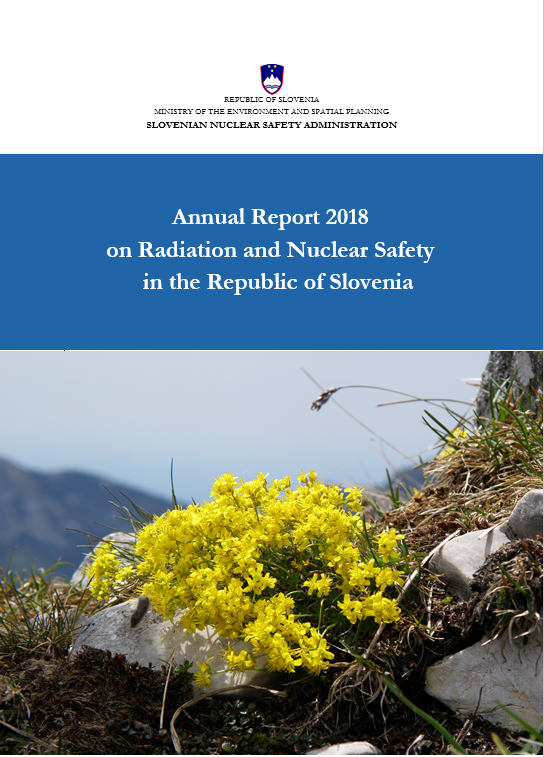The Annual Report 2018 on Radiation and Nuclear Safety in the Republic of Slovenia endorsed by the Government
The report in the Slovenian language, which has been prepared by the SNSA for more than 30 years, summarizes all developments related to nuclear and radiation safety in 2018. The report has already been translated into the English language and is available at the SNSA website.
During the reporting year a fundamental objective of nuclear and radiation safety “The protection of people and the environment from unnecessary harmful effects of ionizing radiation” has been achieved.
In year 2018 there were no significant events in the field of nuclear safety and radiation protection. The Krško Nuclear Power Plant (NPP) operated without any major problems. There was only one manual gradual shutdown due to minor problems in the main transformer control system, which was properly resolved. In the spring, a regular outage was carried out, during which some important improvements were made. The construction of bunkered building 2 (BB 2) and the design of a dry storage for spent fuel also continued.
The European Topical Peer Review (under the Nuclear Safety Directive) continued, within which the reports on the monitoring of the aging of nuclear facilities in the European Union were under review.
On the basis of the review and the resulting recommendations, the SNSA and the Krško NPP are preparing a plan of measures to further improve the state of the plant as regards aging.
During the year, the preparation of new audits of the decommissioning programmes for the Krško NPP and the management of radioactive waste and spent fuel from the Krško NPP was carried out. The new revisions will be the essential basis for determining the share of the contributions that the Slovenian GEN Energija and the Croatian Hrvatska elektroprivreda, as the owners of the Krško NPP, must each pay into the fund. Until the end of the Krško NPP’s operational period, enough funds must be collected to finance the decommissioning of the facility and for the final disposal of radioactive waste and spent fuel, as well as for all compensation to be paid to local communities.
The Coordination Committee, which was appointed in 2017 by the intergovernmental Slovenian-Croatian commission for monitoring the performance of the contract on the ownership of the Krško NPP, monitored the development of the decommissioning programme and the programme for the disposal of radioactive waste and spent fuel, and studied the possibilities for the joint disposal of Slovenian and Croatian radioactive waste from the Krško NPP. For this purpose, Slovenia has proposed Croatia to build a landfill in Vrbina, Slovenia, while Croatia is attempting to build a similar landfill near the border with Bosnia and Herzegovina. As of the end of the year, there was no agreement acceptable to both sides.
The TRIGA Mark II research reactor operated without any major problems in 2018.
The Agency for Radioactive Waste continued its activities regarding the construction of a landfill site for low- and intermediate-level waste in Vrbina near Krško. There were preliminary activities for the public presentation of the report on the environmental impact and cross-border environmental impact assessment of the proposed landfill. Given the dynamic nature of the activities of the authorities involved, the question remains as to how the Krško NPP will operate when the storage capacities for such waste in the plant is filled and a landfill is not available.
At the Boršt hydrometallurgical tailings disposal site of the former uranium mine Žirovski Vrh the problems with rock sliding have not been resolved; therefore, the search for solutions continues.
In 2018 there were no major problems at the organisations and institutions that carry out radiation activities. At the same time, there were only a few interventions due to found sources of ionising radiation in the field.
At the beginning of the year, the new Act on Protection against Ionising Radiation and Nuclear Safety (ZVISJV-1) came into force, with which most of the provisions of the European directive regulating radiation protection were transposed into the Slovenian legal order. Several decrees and regulations were adopted during the year. However, not everything is still ready yet for the implementation of the Act on Liability for Nuclear Damage (ZOJed-1), which was adopted in 2010. States signatories of the Paris Convention are waiting for the entry into force of the Protocol to the Paris Convention, which is expected to happen in 2019.


